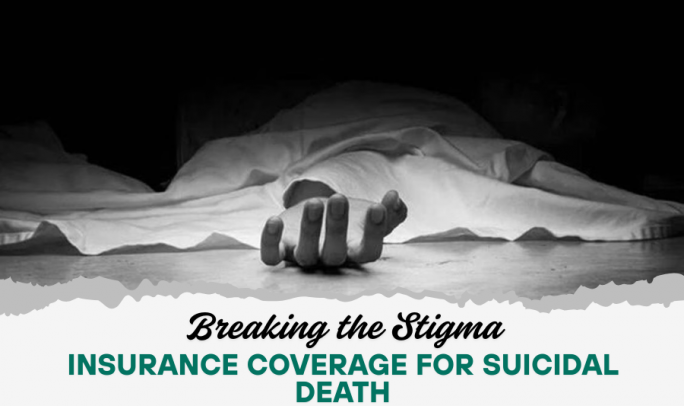Insurance Blog
Understanding Insurance Coverage for Suicidal Death

 Table of Contents
Table of Contents- Does the Suicidal Death fall under the category of Life Insurance in India?
- What are the IRDAI Guidelines or Norms on Suicidal Death?
- Does life insurance cover suicide?
- Military life insurance
- Accidental death insurance policy
- Group life insurance
- Traditional life insurance policy
- Final Words
A vital financial tool, life insurance gives your loved ones security in the event of your absence. However, a frequent query is: Does life insurance in India cover suicide? The solution is not simple. It is contingent upon the insurer, the policy conditions, and specific regulatory standards established by the Insurance Regulatory and Development Authority of India (IRDAI).
Here, we will discuss everything you want to learn about suicide and life insurance in India. You can obtain complete information regarding the rules, waiting periods, exclusions, and what families can expect during the insurance claiming procedure.
Does the Suicidal Death fall under the category of Life Insurance in India?
Suicide is covered under several life insurance policies in popular in India, but only in certain circumstances. According to the rules and guidelines of the IRDAI organization, the nominee may be eligible to obtain the benefits after the demise of the departed person if the insured person commits suicide, as long as the suicide takes place after a waiting period.
What are the IRDAI Guidelines or Norms on Suicidal Death?
IRDAI states that a suicide clause will be included in all life insurance plans issued on or after January 1, 2014. If the insured commits suicide within 12 months of the policy's start date or the date of revival, the nominee is entitled to 80% of the total premiums paid (taxes and rider premiums excluded).
The insurer will get the full amount guaranteed if the suicide occurs after a year. Both group and individual insurance policies are subject to this regulation.
There are no simple answers when a loved one passes away by suicide, but one thing you might wonder is if their life insurance policy is still in effect. Yes, in some circumstances, beneficiaries may still get their money back from a life insurance policy even if the policyholder commits suicide. Exclusions, however, have the potential to render this kind of assertion void. To assist you during this trying time, Bankrate explains how life insurance policies operate in these situations.
Also Read, Importance of a Death Certificate
Does life insurance cover suicide?
Suicide insurance coverage is a sensitive and frequently misinterpreted topic. Understanding how your life insurance policy handles such scenarios is essential to making sure your loved ones are protected, even though it can be difficult to consider. The conditions of your life insurance policy and the type of coverage you own will determine whether or not suicide is covered.
There are "suicide clauses" in many life insurance plans that state that the insurer may deny the death benefit or just reimburse the premiums paid if the policyholder commits suicide within a specific time frame after the policy is issued, usually during the first two years. But most life insurance policies do cover suicide beyond this exclusion period, and beneficiaries would be eligible to get the full death payment. If a policy does not contain a suicide exclusion clause, the insurance provider must pay the full death benefit if the insured person commits suicide, whether or not it was planned.
It's crucial to remember that certain life insurance policy types may contain particular terms and restrictions that affect coverage in these regrettable situations. We'll go over how different policy types handle suicide coverage below so you can better understand what to anticipate from your life insurance.
Military life insurance
Certain life insurance plans with a military focus, such as those provided by Veterans’ Group Life Insurance (VGLI) and Servicemembers’ Group Life Insurance (SGLI), are special in that they usually provide the death benefit to the beneficiaries of the insured regardless of the reason of death. This means that a life insurance policy may still pay the death benefit even if the insured person dies by suicide or an act of war.
Accidental death insurance policy
There may be some ambiguity here. Two factors often determine whether or not an accidental death is covered by a life insurance company: the circumstances surrounding the death and the information the insured provides to the company when completing their policy application. The beneficiaries may still get the death benefit, for example, if the insured declared to their insurance company that they used prescription drugs when they originally filed for their coverage then passes away from an overdose of prescription medicines. Death from an illegal drug overdose, however, is usually not covered.
Also Read, Benefits of Using Professional Hearse Van Services
Group life insurance
Similar suicide clauses to those found in individual life insurance plans are typically included in group life insurance policies, which are frequently offered as part of an employee benefits package. The death benefit might not be awarded if the suicide takes place during the exclusionary period. Suicide is typically covered by group life insurance beyond this time, though.
Traditional life insurance policy
A suicide provision that is effective for a certain amount of time is usually included in traditional life insurance plans, such as term and permanent life insurance. Suicide is typically covered by the policy after this time frame ends, guaranteeing that the beneficiaries will get the death benefit.
Final Words
Only in specific situations do life insurance policies in India cover suicide. IRDAI regulations state that if the insured person commits suicide, the nominee may be eligible to receive the death benefit, provided that the suicide occurs after a waiting period.
Your email address will not be published. Required fields are marked *












